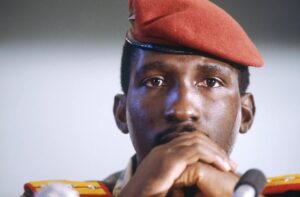By Lisa Vives, Global Information Network
NEW YORK (IDN) — It’s been justice delayed for Thomas Sankara, the man they called Africa’s Che Guevara. It should not be justice denied.
Thirty-five years ago, Sankara, an iconic figure of revolution, the youthful president of the West African nation of Burkina Faso, was shot and killed at the height of his popularity.
For years, his friend and colleague, Blaise Compaore, was suspected of arranging the killing but no investigation was allowed, and the fiction was promoted that Sankara died of natural causes.
Human rights groups and the victims’ families claimed to know otherwise. Compaore, who ruled with an iron fist, has been overthrown after trying to rewrite the constitution and give himself additional years in power, and his flight into exile in neighbouring Ivory Coast has made it possible for a serious investigation could begin.
Compaore’s trial, which began this past October, comes as the West African country reels from its latest military coup last month, brought on by public anger over a stalled economy, entrenched poverty, and relentless jihadist attacks in the country.
To the many who remember him, Thomas Sankara was a fiery Marxist-Leninist and a strong voice against imperialism and colonialism. The international community, whose interests were vested in the status quo, was unhappy with Sankara’s radicalism, not least when he started calling for African countries to reject debt repayments.
According to the testimony of some involved in his assassination, Sankara’s death was ordered by former Liberian president Charles Taylor with the support of the French and American governments.
“Sankara rode a bicycle to work before he upgraded, at his Cabinet’s insistence, to a Renault 5– one of the cheapest cars you could find,” recalled Nigerian-born Paula Akugizibwe. “He lived in a small brick house and wore only cotton that was produced, weaved and sewn in Burkina Faso.”
Feminism was a core element of his political ideology, manifested through improved access to education for girls, and inclusion of women in leadership roles… It was Africa’s greatest success story,” Akugizibwe recalled.
If convicted, Compaore faces 30 years behind bars if he returns to Burkina Faso. But even if Compaore’s trial ends with an acquittal or, less likely, a dismissal of all charges, it will still send a message to human rights violators—military or civilian—that it is no longer business as usual in the region. [IDN-InDepthNews – 15 March 2022]
Photo: Thomas Sankara, widely known as Africa’s Che Guevara. Credit: Patrick Durand / Sygma


